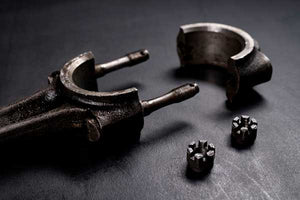Goodson Gazette
Micrometer best practices
We’re going to back up a little to something that’s an essential skill to have in engine machining or any kind of machining for that matter.
You MUST know how to operate and read and care for a micrometer. It sounds, elementary, I know, but sometimes it pays to go back to the basics for a quick review. For the sake of this article, I’ll be talking about an inch micrometer. Most people think of an outside micrometer when they hear the term “micrometer”. An “outside micrometer” is one that measures the outside of something such as diameter, length, thickness.
Measure, Machine, Measure Will Save You Time In The Shop
One of the things that I stressed to my students when I taught at Austin Technical College was the importance of measuring BEFORE starting to machine. Many of my students didn’t get why they should go through all of that trouble. After all, measuring isn’t fun. Machining is. My answer to them was (and still is) how are you going to know what you have if you don’t measure up front?Take Care of Your Measuring Tools And They Will Take Care of You
Back when I was teaching at Riverland Community College (Austin, Minnesota) my students found that one of the easiest ways to get me steamed was to not take care of their measuring tools. A machinist is only as good as his tools and that extends to his (or her) measuring tools.There’s Nothing Boring About Boring Bar Maintenance
By David Monyhan, (retired)
You know the feeling: the machine you want, you can’t afford, and the machine you can afford you already have. Don’t you wish, just once, you could call up the sales representative and say “My turn, send me one of those new ‘XYZ’ machines?”
The Art of Relationship Maintenance
by David Monyhan (retired)
Over the past few years, I’ve written quit a few articles on how to maintain your shop machinery, but now its time to talk about how to maintain your relationships with your customer. Let’s face it…without customers we are out of business. You’ve probably heard the old saying, “all machine shops are alike and that’s just the way it is!”
I don’t think so Tim!
All machine shops are not created equal.
Follow the Clues to Avoid the Come Back Blues
Even before you start the teardown, you can gather a lot of clues about what needs to be done. Encourage your counter guys to engage in as much conversation with the customer as possible. Just listening to him tell why he is bringing you this engine will yield tons of information that goes a long way toward understanding why the engine has failed. Of course if the engine could talk it would tell you all about its life. It’d be nice to have one of those little black boxes like airplanes have to record every aspect of the engine’s life, but until then, the spent engine components you are about to throw away will provide ample clues as to why it failed. Laying out the critical components for review will tell you a story of that engine’s life. It is like looking into the past to prevent a future failure.Your Crankshaft Grinder
Your crankshaft grinder probably represents one of the single biggest investments you’ve made for your shop. Most of you purchased your grinder to insure quality, delivery and to enhance your shop’s ability to be self-sufficient. Hopefully you and your employees are taking good care of this sophisticated and expensive machine. To help you out, here are the basic maintenance requirements for keeping your crankshaft grinder in tip-top shape.Spring Cleaning 101
It’s that time of year again. The racing season is underway. Spring is here and hopefully your shop is getting busier. Before it gets too hectic, it’s time to do some spring-cleaning in your shop.
The first stop is the first place your customers will see – the front counter. Get rid of any old magazines and replace them with new ones. Clean off the counter, take out the trash, wash the windows, replace any burned out light bulbs. It doesn’t need to be spotless, but it’s your only chance to make a good first impression.
Is Your Shop a Safe Place?
Is your shop a safe place to work? Good questions, isn’t it? What do I mean when I say is your shop safe? Let’s put everything into perspective.
One injury could potentially cost you everything. Lest you think I’m being overly dramatic, consider this … while working on an important job your top machinist gets a piece of metal in the eye. You take him to the hospital, probably spending several hours to get him fixed up. The doctor tells you that he has to take the rest of the day off – at least.

